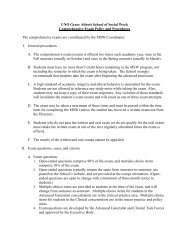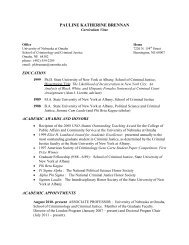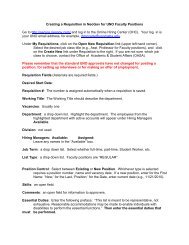It Is Broken. Can It Be Fixed? A Look at the European Union's ...
It Is Broken. Can It Be Fixed? A Look at the European Union's ...
It Is Broken. Can It Be Fixed? A Look at the European Union's ...
Create successful ePaper yourself
Turn your PDF publications into a flip-book with our unique Google optimized e-Paper software.
Ano<strong>the</strong>r concern is th<strong>at</strong> <strong>the</strong> rules are difficult to enforce. Leaving enforcement to<br />
ECOFIN is akin to having <strong>the</strong> fox guard <strong>the</strong> henhouse. This has definitely come to pass, as<br />
evidenced by <strong>the</strong> fact th<strong>at</strong> France and Germany have yet to be penalized, although <strong>the</strong>y have<br />
been thre<strong>at</strong>ened with penalties for exceeding <strong>the</strong> 3 percent deficit limit. Although this paper has<br />
not gone into detail as to how a member st<strong>at</strong>e can be fined for exceeding <strong>the</strong> 3 percent deficit<br />
limit, suffice it to say th<strong>at</strong> a fine is not autom<strong>at</strong>ic, although th<strong>at</strong> very well may be <strong>the</strong> public<br />
perception. Never<strong>the</strong>less, <strong>the</strong> fact th<strong>at</strong> France and Germany have not been penalized does suggest<br />
th<strong>at</strong> larger member st<strong>at</strong>es can ignore <strong>the</strong> reference values to no harm. The inference being th<strong>at</strong><br />
this is a luxury th<strong>at</strong> would not be afforded to smaller member st<strong>at</strong>es. Whe<strong>the</strong>r this is true or not is<br />
certainly open to specul<strong>at</strong>ion. However, it has been cited as <strong>at</strong> least one of <strong>the</strong> many factors<br />
which led <strong>the</strong> Ne<strong>the</strong>rlands to reject <strong>the</strong> Constitutional Tre<strong>at</strong>y this past May.<br />
In fairness, not everyone believes th<strong>at</strong> <strong>the</strong> fault lies entirely, or even primarily with <strong>the</strong><br />
SGP.<br />
There is plenty wrong with <strong>the</strong> SGP – <strong>the</strong> arbitrariness of <strong>the</strong> 3 percent rule, <strong>the</strong><br />
consequent pro-cyclical tendencies, and <strong>the</strong> insufficient room for maneuver it allows to<br />
countries, such as Germany, where <strong>the</strong> one-size-fits all monetary policy is particularly<br />
restrictive....But <strong>the</strong> objective of fiscal discipline which <strong>the</strong> SGP so clumsily and rigidly<br />
pursues is not wrong….The main problem, from which <strong>the</strong> SGP controversy distracts<br />
<strong>at</strong>tention, is <strong>the</strong> <strong>European</strong> Central Bank’s excessive restrictive policy orient<strong>at</strong>ion (Martin,<br />
2005, p. 7).<br />
The ECB has long claimed th<strong>at</strong> its only purpose is to pursue price stability, e.g. control infl<strong>at</strong>ion.<br />
Never<strong>the</strong>less, Martin argues th<strong>at</strong> in its pursuit of price stability, <strong>the</strong> ECB reacted too little, too<br />
l<strong>at</strong>e when economic growth slowed in <strong>the</strong> early 2000s. The unfortun<strong>at</strong>e result was th<strong>at</strong> member<br />
12

















